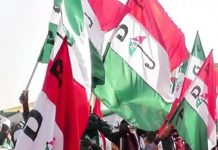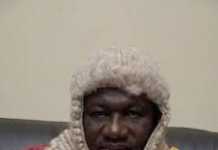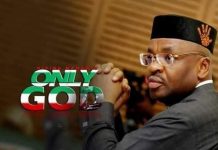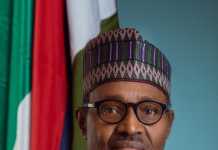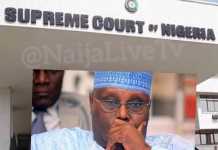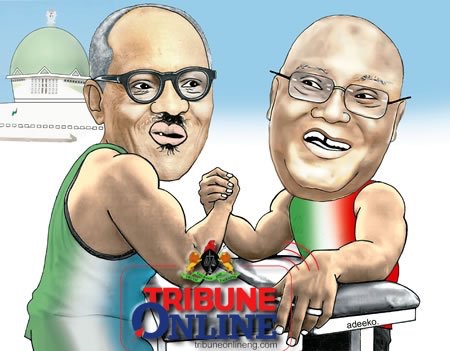
KUNLE ODEREMI captures the admixture of fury, suspense and hypothesis that marked the sitting of the
Presidential Election Petitions Tribunal for weeks, culminating in the delivery of its judgment last Wednesday.
BEFORE the D-Day, the two parties involved in the matter at the five-man Presidential Election Petition Tribunal that sat in Abuja were optimistic of the judgment going their way. The camps were upbeat, as they deployed the machinery of propaganda to the fullest, to sway public sympathy and favour to their principals.
The theatrics and melodrama that characterised the journey to the judgment were thematic and intervallic. It was a journey that was full of the serious, ludicrous and the mundane and even marked by fury, as the legal teams of the candidate of the Peoples Democratic Party (PDP), Alhaji Atiku Abubakar, his All Progressives Congress (APC) counterpart in last February 23, 2019 presidential poll, President Muhammadu Buhari and the Independent National Electoral Commission (INEC) engaged in fireworks, with some occasional attendant anger, disappointment or disapproval from the diverse audience.
The substantive trial, which commenced on July 4, came to a close on August 1, 2019. Of course, the issues raised in the joint petition filed by Atiku and the PDP was that the election was everything but free, fair and credible. With the 180 days provided by law within which an election petition had to dispense the matter, the propaganda war took a dizzying form, otherwise the whole exercise will become a theoretical journey.
Atiku and the PDP had filed a joint petition filed on March 16, 2019, based on their conviction that the INEC erred for declaring Buhari as winner of the February 23 presidential election. In the petition, they insisted that they and not Buhari and APC won the presidential election held on February 23, 2019. To substantiate the claim, the petitioners said the INEC colluded with Buhari, APC and agents of the Federal Government to subvert the will of voters by rigging the election in favour of Buhari.
Accordingly, they asked the tribunal to redress the injustice by nullifying the victory of Buhari and declaring them winner of the election. Coupled with that, they wanted the tribunal to declare the candidacy of Buhari in the election as null and void on the grounds that he lacked the prerequisite academic qualification for the office of President, accusing him of perjury based on the documents he submitted to the INEC while seeking to contest. To underscore the seriousness of their claims, the petitioners promised to present about 400 witnesses within the 10 days allotted to them to prove the weighty allegations.
Morning after judgment
The pre-and post-judgment analyses have come with variants and postulations. A lot of analysts have looked at the judgment of the five-man tribunal beyond the intention of the legal team of the petitioners to head for the Supreme Court over perceived perversion of justice. No doubt, the judgment of the PEPT has far-reaching implications for democracy in the country, especially on the subject of law. It is on record that no sitting president has ever been unseated by judicial judgment over election disputes. Therefore, those who belonged to such school of thought claimed they did not envisage any change in the status quo ante prior to the PEPT judgment.
The question others raised bothered on the fact that the incumbent president had been discharging the functions of his office without let or hindrance and related to the other arms of government based on the principles of checks and balances. In other words, there is no mass movement indicative of public disenchantment and demand for an alternative. The other consideration is the principle of compliance in INEC’s conduct of the poll, which the Justices painstakingly addressed in their judgment because it formed one of the five major grounds raised by the petitioners.
The counsel for Atiku and the PDP made substantial efforts to convince the panel that the election was deficient on the scale compliance with extant laws. There was equally the point that deals with consequence of overturning the result, in the light of the prevailing circumstance and mood of the country. What are the consequences on stability of the country if the petitioners’ demands were upheld; the implications on the ethnic division/tension or the general thinking of the citizenry?
A legal luminary, Chief Wole Oke, while analysising the judgment, harped on the challenges that confront a petitioner over the conduct of a presidential election. He said 14 days allowed by the law for him to collect, collate and synthesise his evidence of proof of infractions constituted a major obstacle. This is because the petitioner is required to prove beyond reasonable doubt any allegations, with suggestions that the situation should necessitate an amendment of the enabling laws and the constitution such that all election issues are settled before swearing in of elected persons as obtained in the United States, which Nigeria copied its presidential model, to ensure justice and equity. Accordingly, many are advocating that the Supreme Court give judgment before a new president is sworn into office.
The process of appointments into the key judicial positions is regarded by some commentators as another point for conversation in the PEPT judgment. It is their view that with the centre empowered to determine the choices, the determination of election petitions is skewed and bound to be subjected to controversy. One observer noted: “There is a difference about realism and idealism. We should be able to guide Nigerians on their expectations. The worst thing is to delude them and reinforce an illusion or a false sense of hope. The Judges were handpicked by the Chief Justice of Nigeria. Who appointed the CJN based on NJC’s recommendation? It’s like the case of an applicant who wrote an application for a job but the job is predetermined. It’s a wise thing to tell the applicant that he won’t get the job. It does not matter if the applicant is angry and begins to blame the truth sayer for his woes.”
The PEPT had unanimously dismissed the INEC’s motion asking Vice-President, Professor Yemi Osinbajo to be joined in the petition, on the ground that he was only nominated by Buhari as his running mate. It also refused Atiku’s prayer seeking Buhari’s disqualification on the ground that he was not qualified to contest the election, as well as rejected the allegations of police and military interference, harassment and intimidation and ballot stuffing among others, filed by Atiku.
However, some pundits are of the opinion that the tribunal ought to have addressed the issue of criminal matters raised by the petitioners. According to them, the PEPF had the power to decide on criminal matters in respect of the conduct of elections. In their opinion, violent disruption through ballot box snatching constituted a grave electoral breach. “Some of those alleged to have committed infractions of the law were captured on camera and are therefore verifiable. They ought to have been subpoenaed to give credence based on Section 36 of the extant constitution,” a legal luminary and former lawmaker said.
The poser of claim by the petitioners of the existence of an INEC server was also rationalised by analysts with their conclusion that the decision of the tribunal on the issue is instructive on the nation’s electoral process. According to them, it has a lot of implications for the conduct of future elections as regards the issue of credibility. “What is the future of the server and the card reader? If the card reader is just a formality, why bother to invest billions into it,” queried another prominent lawyer. Others dissected the judgment based on the controversy over Buhari’s certificate, as the petitioners had accused the president of perjury and sought his disqualification from the presidential contest in the first instance. Some critics cited precedent set in a matter that involved a former principal officer of the House of Representatives now a governor, which they said ought to have been fully addressed by members of the National Assembly to avoid the current quagmire.
Instead, the lacuna has become a goldmine for lawyers at post-election times, the pundits claimed. One observer quipped: “A minimum education does not mean the West African School Certificate. So, the Atiku case was built on sinking grounds. It was like flying a plane with one wing and then depending on prayers as the second wing to get you safely home.” In his own reaction, Deji Adeyanju, convener, Concerned Nigerians group, had also raised some puzzles over the judgment on the issue of certificate as a prerequisite for eligibility of the president. He said the matter was not about political expediency over the principle of law and justice. He said: “Whether anyone likes it or not, it is a dangerous and wicked precedent for our country that can only hunt and destroy the younger generation. What lessons and rules are they setting for especially for young lawyers and law students? “Some people will now tell you that it is because of the political atmosphere in the country. But how can you create a law because of an individual, even when the position of the law is very clear that the President must submit his WAEC or its equivalent. Buhari never submitted any WAEC, First School Leaving Certificate or its equivalent. He only submitted any affidavit from the court. To us it makes no sense and we see it as a great travesty of Justice. For us that is our stand.”
Another observer extended the argument with a claim that the full doze of theatrics witnessed as the matter lasted was no surprise. He said some of the lawyers fell short of living up to their bidding and status. “All the legal hyperbole and gymnastics,” in his view, “was a public show. No president has been removed by a tribunal in Nigeria and this tribunal wasn’t going to set a precedent. At last, it set a precedent that minimum education does not matter anymore in Nigeria. The only lesson some of us see is in that some lawyers are overrated and SAN is now a ceremonial title not earned through hard work. Those SANS need to take those colonial relics they have on off and go back to school to learn something. They are the ones letting down the country.”
However, a number of other experts, among them lawyers, stood in defence of the legal luminaries because of the kind of factors that are often beyond them. One of them expressed doubts that the human-made obstacles constitute a hard nut to crack by even prolific, experienced and intelligent the counsels. His words: “How far can you get when you are faced with a situation of working from answer to question. Like the American realist philosophical school will say: the law is actually what the judge says it is.”
Similarly, another lawyer faulted the critics of the legal luminaries that handled the election petition before the PEPT, stating the criticisms were not just pedestrian but total ignorance on the part of the critics. “What did the Tribunal say about Atiku’s case against Buhari? Did they say it was frivolous or that no cause of action that warranted Atiku and his lawyers to approach the court has arisen? It’s so pitiable that people will blazingly demonstrate their ignorance with uttermost stupidity and joy,” an eminent lawyer said.
It is against this background that some stakeholders are proposing an urgent action on the Electoral Act as soon as the National assembly resumes from break. They are advocating that the lawmakers take a critical look at the provisions based on grey areas identified as reflected in the PEPT judgment on the Atiku versus Buhari matter and act accordingly. Their suggestion is that the issues should be sorted out expeditiously ahead the governorship poll coming up on November 16 in Kogi and Bayelsa states. One of the advocates said: “The way forward is for the National Assembly to immediately, upon resumption, transmit the amended Electoral Act to the president for his immediate assent before the Kogi and Bayelsa elections. Anything outside e-collation and e-transmission of results, we will be joking about our commitment to credible elections and toying with calamities. Without the amended Act signed into law, it is better to jettison the card reader in its entirety because it is of no effects whatsoever on our electoral process.”
For the ruling All Progressives Congress (APC), the battle has been won and lost, no matter the options both Atiku and the PDP might resolve to take after going back to the drawing board. In the words of APC national chairman, Adams Oshiomhole, “We as a party we are confident that if it is within the Nigerian law for the PDP to go even to the World Court, we will meet them there. The Supreme Court of Nigeria is not that of the PDP or the APC. The Supreme Court is governed by law and it’s to interpret the evidence before the Court of Appeal. They are not at liberty to introduce new issues, neither can they bring in new witnesses.” On its part, the PDP has rejected the judgment because of its belief that the tribunal was not fair and just despite the avalanche of documentary evidence the party presented before the PEPT.
With the first phase in the battle over the outcome of the election over, the prelude to the next and final phase, which is the Supreme Court, is the attendant deluge of reactions to the ruling of the five-man tribunal on Wednesday, which was nothing but an anti-climax to the weeks of suspense, expectations and permutations across board.
The PDP/Atiku petition: Background
In the 146-page petition, Atiku and the PDP had claimed that, from the figures collated from their agents in all the polling units, ward collation centres, local government area collation centres, and the state collation centres in all the states of the federation and the Federal Capital Territory (FCT) Abuja, as well as at the national collation centre, he scored a total votes of 18, 356, 732 as against Buhari’s 16, 741, 530. The petitioners claimed that the figures, available in the server of INEC, were at variance with those declared by the INEC, which credited Atiku with 11, 262, 430 votes, while Buhari got 15, 191, 847 to emerge the winner. The petitioners contended that Buhari was not duly elected by majority of lawful votes cast at the election and that, from the data on each state of the 36 states and the FCT, in the purported INEC’s server, Atiku, as opposed to Buhari, scored the majority of lawful votes cast at the election.
According to the petitioners: “Smart card readers deployed by the first respondent, in addition to accreditation, equally transmitted electronically, the results of voting from polling units directly to the server of the first respondent. The presiding officers of the first respondent directly inputted the results from the polling units at the end of voting and transmitted directly to the server, in addition to manually taking the Form EC8As to the wards for collation. The 1st Respondent is hereby given notice to produce the records of results from each polling unit uploaded and transmitted electronically by officials of the 1st Respondent through smart card readers to the first respondent’s servers.”
Commencement of matter
When the matter actually commenced on July 4, 2019, a renowned constitutional lawyer, Professor Ben Nwabueze (SAN), appeared on the side of the petitioner. In his brief submission, Nwabueze, who came into the venue of the panel on a wheelchair as the lead counsel for the petitioners, urged the tribunal to be fair and just in handling the petition. He stated in a two-page statement submitted with the court registrar that, “The determination of the petition will certainly impact on future elections and constitutionalism in the country. Notwithstanding of my age 87 and attendant health challenges, I attended this proceedings to underscore the importance of the case.” Nwabueze said, based on the preponderance of the opinions of Nigerians, he believed that there was something fundamentally wrong with the conduct of the election. “They suspect that the latter was manipulated or, in more familiar language, rigged. What is not known is how or by whom the rigging was done,” he added.
Kindly contact us @ Naijalivetv@gmail.com
Call or Whatsapp: 07035262029, 07016666694, 08129340000



